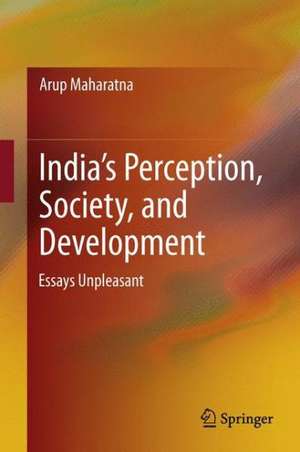India’s Perception, Society, and Development: Essays Unpleasant
Autor Arup Maharatnaen Limba Engleză Hardback – 23 mai 2013
| Toate formatele și edițiile | Preț | Express |
|---|---|---|
| Paperback (1) | 635.80 lei 6-8 săpt. | |
| Springer India – 23 iun 2015 | 635.80 lei 6-8 săpt. | |
| Hardback (1) | 642.03 lei 6-8 săpt. | |
| Springer India – 23 mai 2013 | 642.03 lei 6-8 săpt. |
Preț: 642.03 lei
Preț vechi: 755.33 lei
-15% Nou
Puncte Express: 963
Preț estimativ în valută:
122.86€ • 126.94$ • 102.20£
122.86€ • 126.94$ • 102.20£
Carte tipărită la comandă
Livrare economică 19 martie-02 aprilie
Preluare comenzi: 021 569.72.76
Specificații
ISBN-13: 9788132210160
ISBN-10: 8132210166
Pagini: 204
Ilustrații: XVII, 183 p.
Dimensiuni: 155 x 235 x 17 mm
Greutate: 0.46 kg
Ediția:2013
Editura: Springer India
Colecția Springer
Locul publicării:New Delhi, India
ISBN-10: 8132210166
Pagini: 204
Ilustrații: XVII, 183 p.
Dimensiuni: 155 x 235 x 17 mm
Greutate: 0.46 kg
Ediția:2013
Editura: Springer India
Colecția Springer
Locul publicării:New Delhi, India
Public țintă
Popular/generalCuprins
PART I: Quarrelling with Indian Perceptions.- Chapter 1: Quarrelling with Indian Perceptions.- Chapter 2: Dear, departed ones.- Chapter 3: ‘Dreaming Bengal’.- Chapter 4: Reforming Babu’s Worldview.- Chapter 5: The National Library, Calcutta: A Reader’s Rendition.- Chapter 6: An Anatomy of Work Culture.- Chapter 7: Sketching Tagore as a Social Activist.- Chapter 8: India’s family planning programme: a muddle extraordinary.- Chapter 9: In Resurrection of Gunnar Myrdal’s Asian Drama.- PART II: Market, Media, and Development.- Chapter 10: On the Invasion of Neo-liberalism into Development Thinking.- Chapter 11: What education?.- Chapter 12: What is meant by ‘changing times’ after all?.- Chapter 13: Commodities, Comforts, and Chaos.- Chapter 14: Market, Media, and Mediocrity.- Chapter 15: Migration, Mediocrity and Misery.- Chapter 16: In the name of ‘accident’: India’s road traffic deaths and injuries?.- Chapter 17: The Demography of North-East India: Perilous Pluralism?.- PART III: Society, Culture, and Dilemmas.- Chapter 18: ‘Who is civilised’? On the tribal traditions, society, and culture.- Chapter 19: India’s Social Stratification: Demography and Dilemmas.- Chapter 20: Aping the ‘awful’? Recent Trends in India’s North-South Cultural Divide.- Chapter 21: Understanding Modern Hindu Mind: Resurrecting Ashok Rudra’s Reading.
Notă biografică
Arup Maharatna has held the post of Professor at the Gokhale Institute of Politics and Economics since 2001. Prior to his current appointment he was of Professor of Economics and before that Head of Department of Economics at the University of Burdwan. Arup Maharatna did his Masters and Ph.D. in Demography at the London School of Economics from 1988-1992. Futhermore, he did his Bell Post-Doctoral Fellowship at Harvard Center for Population and Development Studies, Harvard University from 1997-98. He has authored two books/monographs published by the Oxford University Press.
Textul de pe ultima copertă
There has been, of late, a growing realisation that the pace and pattern of economic development of a country can hardly be understood and explained comprehensively in terms of the straitjacket of economics discipline alone. India is a prime example of the importance of the part played by a country's history, culture, sociology, and socio-cultural-religious norms, values, and institutions in its development process. This book, with its assorted essays of varying depths of scholarship and insightful reflections, attempts to drive home this point more forcefully than ever before. In its search for the non-economic roots of India’s overall sloth and murky progress in its broad-based economic and human development, the book illuminates major oddities deep inside a unique mental make-up full of perceptual and ideational dilemmas, many of which are arguably shaped by the long-lasting and dominant influence of what could be called the Brahminical lines of thinking and discourse. With India’s hazy and dodgy world of perceptions as a backdrop, the book also addresses – through its intelligent essays - the deep and sometimes dire ramifications of the historic advent and the dramatic advance of neoliberal market ideology today.
Caracteristici
It dissects - unambiguously and succinctly - the particularities/peculiarities of Indian perceptions and thoughts illustrated and elaborated in terms of specific contexts and issues The arguments and thoughts contained in the essays strike impeccably and compellingly at the roots of the problem/issue under consideration It brings to the fore some basic oddities of Indian hybrid thinking and of its socio-cultural features and values and their deeper religious/spiritual underpinnings














